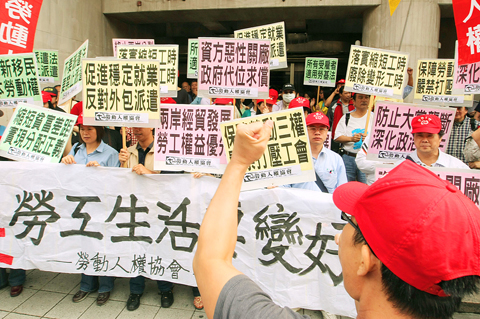Labor activists voiced concern yesterday that president-elect Ma Ying-jeou’s (馬英九) policies for reviving the economy could rely too heavily on large corporations and that the rights of blue-collar workers may be sacrificed.
“Ma promised to improve the economy and make life easier — we workers deserve a better life too!” Labor Party secretary-general Tang Shu (唐曙) told a crowd of around 100 people from various labor unions who gathered outside the Legislative Yuan.
“It makes us very worried, when we look at Ma’s economic platform,” Tang said. “It seems that Ma is aiming to make life better for corporations but not for workers.”

PHOTO: CNA
One of Ma’s “i-Taiwan 12 projects” to boost domestic consumption through infrastructure — turning Taiwan Taoyuan International Airport into an “air city” — was the focus of particular criticism.
The proposal would make the airport a special administrative zone and surrounding areas would be managed by an independent administration run by a board of directors.
The board would be authorized to plan the special zone’s development, manage the airport facilities — which are now under the jurisdiction of the Civil Aeronautics Administration — and invest in transportation and other industries.
Businesses operating in the zone would enjoy special tax breaks.
In addition to the airport, Ma also plans to establish a free-trade port nearby as part of the project.
Labor Rights Association executive director Wang Chuan-ping (王娟萍) said the project may sound ambitious, but it is a potential nightmare as far as workers rights are concerned.
Proposed legislation governing the special administrative zone would exempt it from Labor Standard Law (勞動基準法) regulations on the employment and treatment of foreign workers.
“It not only means that these [foreign] workers will have less protection [of rights], it also means that local workers will be less competitive,” Wang said.
The activists are also concerned that outsourcing could increase under Ma’s platform to boost economic links with China.
“We don’t mind developing cross-strait economic and trade relations, but workers rights should be the top consideration during the decision-making process,” Tang said.

Chinese Nationalist Party (KMT) Chairman Eric Chu (朱立倫), spokeswoman Yang Chih-yu (楊智伃) and Legislator Hsieh Lung-chieh (謝龍介) would be summoned by police for questioning for leading an illegal assembly on Thursday evening last week, Minister of the Interior Liu Shyh-fang (劉世芳) said today. The three KMT officials led an assembly outside the Taipei City Prosecutors’ Office, a restricted area where public assembly is not allowed, protesting the questioning of several KMT staff and searches of KMT headquarters and offices in a recall petition forgery case. Chu, Yang and Hsieh are all suspected of contravening the Assembly and Parade Act (集會遊行法) by holding

PRAISE: Japanese visitor Takashi Kubota said the Taiwanese temple architecture images showcased in the AI Art Gallery were the most impressive displays he saw Taiwan does not have an official pavilion at the World Expo in Osaka, Japan, because of its diplomatic predicament, but the government-backed Tech World pavilion is drawing interest with its unique recreations of works by Taiwanese artists. The pavilion features an artificial intelligence (AI)-based art gallery showcasing works of famous Taiwanese artists from the Japanese colonial period using innovative technologies. Among its main simulated displays are Eastern gouache paintings by Chen Chin (陳進), Lin Yu-shan (林玉山) and Kuo Hsueh-hu (郭雪湖), who were the three young Taiwanese painters selected for the East Asian Painting exhibition in 1927. Gouache is a water-based

Taiwan would welcome the return of Honduras as a diplomatic ally if its next president decides to make such a move, Minister of Foreign Affairs Lin Chia-lung (林佳龍) said yesterday. “Of course, we would welcome Honduras if they want to restore diplomatic ties with Taiwan after their elections,” Lin said at a meeting of the legislature’s Foreign Affairs and National Defense Committee, when asked to comment on statements made by two of the three Honduran presidential candidates during the presidential campaign in the Central American country. Taiwan is paying close attention to the region as a whole in the wake of a

OFF-TARGET: More than 30,000 participants were expected to take part in the Games next month, but only 6,550 foreign and 19,400 Taiwanese athletes have registered Taipei city councilors yesterday blasted the organizers of next month’s World Masters Games over sudden timetable and venue changes, which they said have caused thousands of participants to back out of the international sporting event, among other organizational issues. They also cited visa delays and political interference by China as reasons many foreign athletes are requesting refunds for the event, to be held from May 17 to 30. Jointly organized by the Taipei and New Taipei City governments, the games have been rocked by numerous controversies since preparations began in 2020. Taipei City Councilor Lin Yen-feng (林延鳳) said yesterday that new measures by